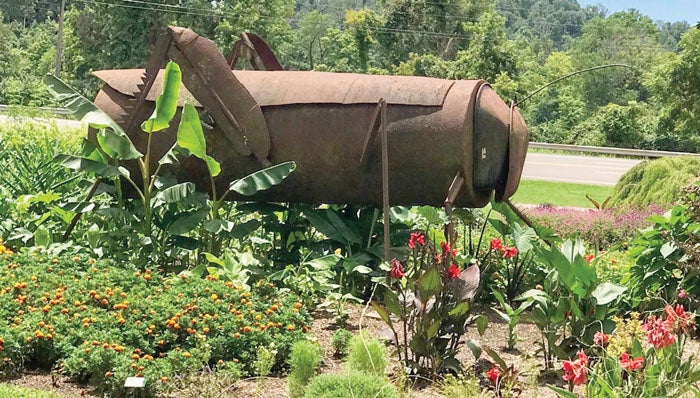Pollinator protection is for everyone
Published 12:00 am Friday, September 7, 2018

- Submitted photo They have really big grasshoppers in the gardens at the University of Tennessee at Knoxville.
By Amy-Lynn Albertson
Rowan County Extension Director
This summer I visited my alma mater, the University of Tennessee in Knoxville. The UT gardens are spectacular and I highly recommend you visit if you are ever in Knoxville.
The UT gardens are a trial garden just like the gardens at Raulston Arboretum at N.C. State University. Each year they evaluate hundreds of varieties of flowering plants and publish an annual report. The plants are evaluated for their growth habit, heat and drought tolerance, as well as flower power.
As we move hopefully into cooler weather, many of us are ready to go work in the garden again. We all know that fall is the time for planting, so start looking now for trees, shrubs and perennials to add to your landscape.
Visiting gardens like the UT gardens or the JC Raulston Arboretum is a great way to see how plants behave in our climate and what they may look like at their mature size. At the UT gardens, they have incorporated many native plants into their gardens to enhance and encourage their pollinator power.
Did you know that 75 percent to 95 percent of all flowering plants rely on pollinators for pollination? North Carolina has a $78 billion agriculture economy that relies on pollinators for crops such as cucumbers, squash, blueberries and strawberries.
It’s been estimated that native pollinators are responsible for pollinating almost $3 billion U.S.-produced fruits and vegetables. Only 2 percent of wild bee species do 80 percent of the pollination.
In North Carolina, we have 13 known bumblebee species, several of which are threatened. In addition to our bumble bees, N.C. is home to 174 species of butterflies and 1,200 moth species. In order to encourage these pollinators to come to your farm/garden or yard you need to plant some pollinator friendly plants.
My friend Debbie Roos, Chatham County Extension Agent, has made a great list of 25 pollinator plants for N.C. You can find that list at growingsmallfarms.ces.ncsu.edu, and you can hear her speak at the “Bee Pollinator Friendly” Field Day on Saturday, Sept. 8, from 1 to 4:30 p.m. at the Piedmont Research Station in Salisbury.
Attendees will rotate through several stations to learn about habitat for farms, roadsides or constructed pollinator meadows; native plants that make for good pollinator habitat; native bees, butterflies and beneficial insects; honey bees and beekeeping; pesticide application techniques to protect pollinators; and how to use available technology to map honey bee and specialty crop locations.
This field day is free and for anyone interested in learning more about pollinators and how to protect and promote their habitats. Please register by going to http://go.ncsu.edu/pollinator-field-day. For more information about pollinators, or other horticultural topics call the Rowan County Extension Center at 704-216-8970.



